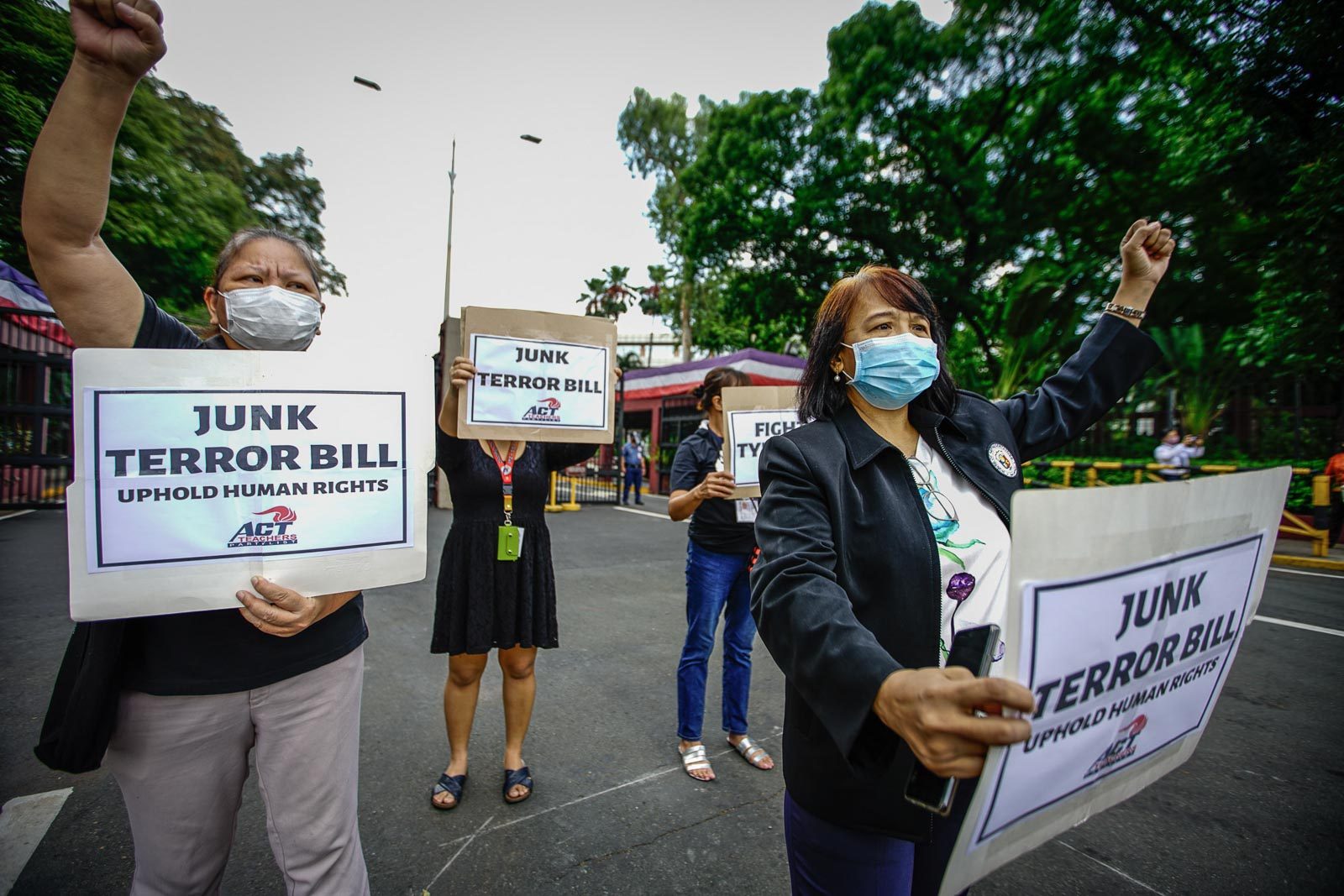SUMMARY
This is AI generated summarization, which may have errors. For context, always refer to the full article.

MANILA, Philippines (3rd UPDATE) – The controversial anti-terrorism bill that human rights advocates warned could be used to stifle government critics hurdled Congress on Wednesday, June 3.
The House of Representatives approved on 3rd and final reading House Bill (HB) No. 6875 or the proposed Anti-Terrorism Act of 2020, a similar version of the bill the Senate had already passed in February.
An overwhelming 173 lawmakers gave their thumbs up to the bill, while only 31 voted no. A total of 29 abstained from the vote.
But on Thursday, June 4, House Deputy Speaker Aurelio Gonzales Jr announced changes in the final vote record, citing “technical error in the recording of electronic votes.”
The 173 yes votes were reduced to 168, while the no votes increased from 31 to 36. The 5 additional lawmakers who voted no, however, were not enough to overturn the passage of the anti-terror bill.
The House has yet to release the list of how lawmakers voted.
HB No. 6875, which would amend the Human Security Act of 2007, was approved just two days after President Rodrigo Duterte – who is allied with a majority of House members – certified the anti-terrorism bill as urgent.
Because the House and the Senate approved similar versions, the anti-terror bill no longer needs to pass through lengthy bicameral conference committee hearings. Instead, the measure will become an enrolled bill which can immediately be sent to Malacañang for Duterte’s signature.
“No need for bicameral conference committee since there are no disagreeing provisions. When approved on 3rd reading, it will be an enrolled bill for the action of the President. He may sign, veto any or all provisions, or not act on the measure for it to lapse into law,” said Puwersa ng Bayaning Atleta Representative Jericho Nograles, a co-author of the bill.
House members spent 4 hours on Tuesday, June 2, debating on the contentious provisions of the anti-terrorism bill before approving it on 2nd reading.
Hours before HB No. 6875’s passage, lawmakers from the progressive Makabayan bloc joined protesters outside the Batasang Pambansa to condemn the railroading of the anti-terror bill.
They include ACT Teachers Representative France Castro, Bayan Muna Representatives Eufemia Cullamat and Ferdinand Gaite, Gabriela Women’s Party Representative Arlene Brosas, and Kabataan Representative Sarah Elago. Along with House Deputy Minority Leader and Bayan Muna Representative Carlos Zarate, the Makabayan bloc voted no to the anti-terror bill.
Section 29 of the measure would create the Anti-Terror Council (ATC) composed of top Cabinet officials to do functions otherwise reserved for courts, like ordering the arrest of people it has designated to be terrorists. (READ: CHR brands anti-terror bill ‘highly intrusive,’ open to abuse)
HB No. 6875 would also empower any law enforcement agent to arrest and detain without warrant “a person suspected of committing any of the acts” punished under the measure – as long as the ATC authorizes it.
Section 4 of HB No. 6875 defines the following acts as terrorism, ranging from endangering a person’s life to mere planning to commit such an act:
- Engaging in acts intended to cause death or serious bodily injury to any person or endangers a person’s life
- Engaging in acts intended to cause extensive damage or destruction to a government or public facility, public place, or private property
- Engaging in acts intended to cause extensive interference with, damage, or destruction to critical infrastructure
- Developing, manufacturing, possessing, acquiring, transporting, supplying or using weapons
- Releasing dangerous substances or causing fire, floods, or explosions when the purpose of such act, by its nature and context, is to intimidate the general public, create an atmosphere to spread a message of fear, provoke or influence by intimidating the government or any international organization, or seriously destabilize or destroy the fundamental political, economic, or social structures in the country, or create a public emergency or seriously undermine public safety
Persons who propose, incite, conspire, and participate in the planning, training, and facilitation of a terrorist attack could face a sentence equivalent to life imprisonment without parole.
The same punishment goes for persons who provide support to terrorists and recruit others to be a member of a terrorist organization.
Persons found guilty of the following acts will be punished with 12 years of imprisonment:
- Threatening to commit terrorism
- Inciting others to commit terroristic acts
- Voluntarily and knowingly joining any terrorist group or association
- Being an accessory in the commission of terrorism
Under the anti-terror bill, a suspect can be detained without a warrant of arrest for 14 days, extendable by 10 more days. They can also be placed under surveillance for 60 days, extendable by up to 30 more days, by the police or the military.
Albay 1st District Representative Edcel Lagman, who also voted no on Wednesday, slammed the anti-terrorism bill’s “draconian” provisions. The opposition lawmaker hit Duterte for certifying the measure as urgent over other bills aiming to respond to the coronavirus pandemic.
“President Rodrigo Duterte errantly considers more urgent the suppression of sporadic ‘acts of terrorism’ by instituting draconian measures than enacting an economic stimulus package granting relief to distressed people and businesses in the wake of the still raging COVID-19 pandemic,” Lagman said.
House committee on human rights chairperson Bong Suntay and Magsasaka Representative Argel Cabatbat had tried to propose amendments to the anti-terror bill to address its unconstitutional provisions, but they were rejected. – Rappler.com
Add a comment
How does this make you feel?
There are no comments yet. Add your comment to start the conversation.